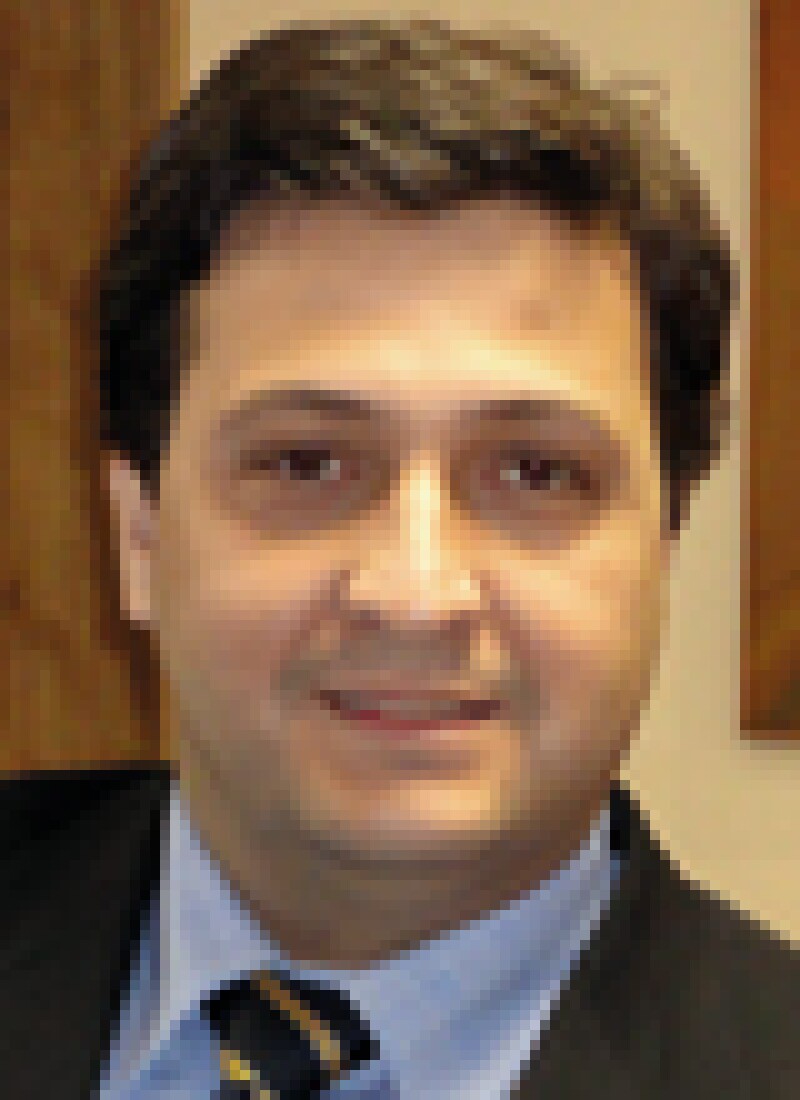Sponsored by

JN: Is there a lot of patent litigation in Mexico? Is it increasing?
AL: There has been a boom during the past eight to 10 years. In the pharmaceutical industry the battle between the generics and innovators has triggered this, although the number of patent cases has also increased in other technical areas. It's in the pharma industry where most patent litigation disputes are right now.
Before 10 years ago, the number of patent cases was minimal. Then we had the enactment of the linkage regulation, which triggered patent litigation in the pharma industry. Globalisation was also a factor, and the increase in trade following Nafta and other treaties with Central and South America. We have more importation of products from abroad and in the pharma industry the requirement to have a facility in Mexico and approval to produce a pharmaceutical product is the reason we have more imports from abroad, especially medicines.
JN: Do you see a similar trend in Brazil?
It's similar. We have a big number of patent cases in recent years. We do have some problems with the Brazilian PTO issuing patents and the time that patent litigation takes. Most litigation is in the chemical field involving pharma companies.
The latest development in the past month was a decision of the Supreme Court saying that nullity action of a patent will only be considered if the Brazilian PTO is part of the court action in the Federal Circuit. This is a new interpretation as our law says clearly that nullity can be claimed as a defence. But now the Supreme Court says you can only do that in particular actions. If you are enforcing patents, maybe this is good news.
JN: From a US perspective, do you think parties in litigation are satisfied with what's available in the region?
I spend my time primarily in Brazil. For US companies or those that have operating companies in Brazil, the primary concern is access to courts and the treatment that patents receive. Compared to some other regions of the world, Brazil has an even-handed judiciary and performs a lot of the same analysis you would expect in a common-law country.
In terms of the numbers of cases, we see a lot of disputes that arise out of licensing where a licensee challenges a patent or a licensor wants to enforce a patent against a licensee that's not performing. It's a sign of the amount of business going on in Brazil.
I don't have a lot of US companies or multinationals with a strong presence in the US complaining about problems or corruption – which goes on in other parts of the world. That is good. Could the system be faster? Sure, but so could the US system. Coming from the US, there are more similarities than disparities. In other parts of South America, I see very little of US companies being involved in litigation. In Argentina, we expect to see some challenges to patentability for the pharmaceutical sector but overall I receive very few requests from industry.
JN: Is that also your experience Sheila?
Participants |
||||||||||||
|
SA: The companies that come to me don't have problems with patents, it tends to be more trade mark enforcement. If they have problems, they are well dealt with by the law offices they work with. There are not so many British companies registered in Brazil who need my assistance.
JN: It all sounds quite positive. Is that your experience Gabriela?
GD: The company that I work for was established in 2011. Before that, I worked at Philips. My experience in Latin America, and especially Argentina where I'm located, is that things are improving but not as much as we wish. Litigation takes a long time – in Argentina, a final judgment on a case may take six years and the same happens in other countries of Latin America. In Argentina, there are no specialised courts or judges for IP issues, you must resort to commercial and civil courts, and such fact is one of the reasons for delays.
The law hasn't changed in a while. Actually, it's not easy to amend national laws, and we still have some weak points. For instance, goods in transit which are infringing a patent can't usually be stopped as in the case of trade marks. Another example of a weak point is that, in Mexico and Argentina, it's not easy to get infringing products destroyed. An example of what happens in Brazil is that, when you start patent infringing actions and you get a reply for nullity, all the lawsuit is stopped until the nullity issue is first solved. Such process can take many years, so it is used as a strategy by the defendants, since they gain a lot of time until the infringing action may be resumed.
JN: Do you agree that is an issue in Brazil?
AG: We do suffer the interpretation of the law by each judge: sometimes they stop the action pending the nullity hearing and sometimes not. In the Federal Circuit, we do have specialised judges for nullity actions and they are fast to file the first decision. Most of them are in Rio de Janeiro, there might be eight or 10 of them.
JN: What about in Mexico?
AL: We have specialised judges at the appeal court. The venue for disputes at the first stage is at the PTO, then they are reviewed by a specialised court within the Court for Tax and Administrative Affairs. Final stage the cases are decided by administrative circuit courts. Gabriela raised a very important issue, which is the timeframes. The main problem in Mexico is the long time you need to litigate for a final decision that someone infringed your patent. According to our system, you cannot claim damages until you have a final decision in the administrative proceeding, and there may be four stages of appeal. That can take years to exhaust all the technical evidence to confirm whether or not there was infringement. After that, the patent holder can go to another venue – a civil court – to claim damages, which may take three stages. That is the main flaw in our enforcement system in Mexico. You cannot claim damages at the same time you claim your right was violated. The whole process can take at least 10 years. Some defendants will try to delay the proceedings, raise any type of defence and counterclaim the invalidity of the patent based on any evidence they have available.
The timeframe would not be so bad if preliminary injunctions were effective. Although we have strong preliminary injunctions provided in the IP law, the defendant can post a counter-bond before the PTO and the preliminary injunction will be lifted. The law does not require anything else and that is a big problem. The penalty for that is a fine that goes to the government. The Mexican IP association has proposed a modification to the law to give the patent holder the option to go directly to a civil court to claim that their right is violated and to claim damages at the same time. That is now under discussion in the Mexican Congress.
AG: In Brazil the court you go to depends on the case. The general rule in Brazil is to file the court action where the defendant is located. In many cases these judges don't deal with IP cases frequently. At second stage, we have some magistrates who understand more and decisions are better. It's very important for strategic reasons – you can push cases to a different place.
JN: Are there things that international companies would like to see improved?
SA: The most complaints I have heard is that it is too slow to litigate in Brazil, and there is a lack of specialised judges. Brazil is trying to improve its innovation scene, but IP is not so well known in the community as a whole. The National Confederation of Industry in Brazil (CNI) is trying to improve things by training magistrates in the courts where most of the cases are. But the other problem is that many cases go to Rio de Janeiro, because that is where the specialists are, and that creates a backlog. There is also a tendency for judges to favour local parties and that means foreign parties tend to go to the courts in Rio or Sao Paulo. The problem extends beyond just IP though.
AK: Slowness is the biggest US company complaint, but that is common worldwide. CNI are a terrific partner in general, and as Sheila said they published a wonderful book for the judiciary. As you get further from Rio or Sao Paulo, there are many judges who don't get many IP cases, just as you see in the more remote parts of the US.
Part of the slowness complaint is that the Brazilian PTO has a backlog. However the government has recently given them more resources to hire more examiners, which is welcome. I think you will see those complaints become less prominent as the speed of examination improves. Information sharing and best practice programmes are very effective in alleviating these kinds of problems.
JN: Are there particular reasons why the courts are slow?
GD: In Argentina, courts are slow in many areas, not just in patent cases. Part of the problem is that expert witnesses take a long time to produce reports and to reply to requests. Another factor is the time it takes to amend national law. There have been for a long time requests to amend the law, but no actual action was ever taken. Mainly, amendment requests are brought by pharmaceutical companies, but other companies should also be involved to increase lobby pressure. Specialised courts and judges, who don't have to deal with a lot of other commercial cases, would be a big improvement.
JN: What strategic issues should parties in litigation be aware of?
AJ: There are some key factors for a strategy to tackle infringements. The first thing to consider is what type of preliminary injunction you want, and that depends on the kind of infringement you face. Then you need to post a bond and a very important decision in the strategy is the amount of the bond. As I mentioned, the defendant may lift the injunction by posting a counter-bond. The higher the amount, the more difficult it is for the defendant. You need to consider how strong your patent is, you can post a higher amount as a bond and avoid the counter-bond, and you can stop the infringement during the litigation – which as I said may last 10 years. That may be the main goal of your strategy achieved. You need to provide certain information about the infringing activity and you can decide the amount of the bond along with the PTO. We have seen bonds posted for more than $1.5 million but it varies case-by-case depending on the amount of information you have and whether for example it is a public tender and if so how much product will be acquired by the government so you have an idea of how much money will be involved. There is no minimum in the law.
Second, because patent proceedings can take many years, we always recommend having a general strategy including other actions as well as patent litigation, for example actions based on unfair competition, or under the Consumer Law or before regulatory agencies such as COFEPRIS, which regulates pharmaceutical products in Mexico. If there are health concerns about the infringing product, for example, you should raise those before the relevant regulatory agency and that may help to recall the infringing product. You should consider the long time for patent litigation and the contingency money-wise for the defendant could be far away.
Patent litigation in Mexico and before IMPI is mainly brought by foreign companies. The number of patent applications by domestic inventors and companies is very low. It is changing as the Mexican government now has as a priority to improve innovations for Mexicans.
AG: In Brazil the most important thing is understanding the subject of the patent. In some cases in the past, involving process claims, it's very difficult to show to a judge that a company is using the same process claim. In this case the priority was to show that a machine was using the same process as claimed in our patent. Sometimes we ask for a preliminary injunction with a bond and sometimes not. We have to build evidence to show to the judge our rights; the judge must understand the technical documents to give us the decision.
We have seen examples of two companies fighting each other in many countries, and it's important to elect a leading case and for other countries to follow that and use the same arguments, while avoiding arguments that can be used against you in other countries.
GD: One important thing for patent owners is to explain how their patent was infringed, and a technical report must be issued to explain how that happened. That's one of the main issues. Such a technical report usually has to be prepared by a specialised engineer, and finishing it might take a long time. It depends on the country but, usually, the law allows you to call another expert on the side of the alleged infringer and a third one when the other two experts differ. The patent owner must prove that the patent is being used in a product –and such fact has to be understood and explained by a specialised engineer– and it has to be easily explained and proved to the court.
The second thing is that if the patent owner forgets to pay the annuity fee to the PTO, he/she will not be able to bring any lawsuit, so don't forget to do it! Therefore, one strategy would be to check if the patent owner has complied with all the annual payments. Another strategy for the defendants is to try to minimise the damage and to negotiate if they see no way out so that they can continue manufacturing.
JN: What issues would you like to see improved?
AK: The offices in South America are going to benefit from increased information sharing, for example where a piece of prior art invalidates certain claims. As you see the various offices become part of a network, such as the PPH or the PROSUR initiative in South America, that part of litigation will become more certain. Parties will be able to say: if these claims are good and valid in one country, then the search and examination results in that country may benefit other countries. We see that outcome on the horizon and support it. If the quality of the patents rises, there will be less frivolous litigation or litigation where the parties don't know what the patent means and are asking a generalist judge to decide that. It's a global issue.
SA: We have a good law in Brazil but there is a lack of a political will to make things work faster. There are some improvements on the government side, but it needs more effort to make things better. Information sharing would make it stronger, I agree. The Office is hiring more staff and it will improve. And PROSUR is going to be very good in getting all the offices working together – including building an online data tool, to have a complete system for all participants.
AL: There are three things in Mexico. First, if we have the possibility to claim damages at the same time as claiming violation of the rights, that would be a big improvement. Second, establish higher standards to lift preliminary injunctions so they have to do more than just post a counter-bond: that enables you to just pay to violate the law. Third, we need some guidelines for deciding technical disputes. We require certain guidelines to decide the proof of experts for infringement and cancellation cases. We need more guidelines to evaluate and apply the decisions on technical evidence.
AG: I agree with Albert that patent examination is where everything begins and it is important to improve that. The second point is the timeframe, to have settled decisions. The other thing is to improve the quality of judges and in particular experts, who have a very important role in patent litigation because the judges do not understand the technology. Experts are mostly appointed by the judge in Brazil.
GD: We should take as an example other countries where things work better. IP rights are like other rights, so they must be respected. The relevance of innovation and research must be taken into consideration in each of our countries because, if patent rights are adequately protected, people will be interested in investing in technology in our countries, but we need better and stronger protection. As people have said, quality experts and judges and specialised courts are needed in each country, especially in Argentina. It is also important to be able to request the destruction of goods, and actually have such goods destroyed (instead of spending years waiting to see any results)! Such things will lead to a better protection of IP rights. But, overall, I am optimistic that things have improved since IP rights started to be more relevant in Latin America. And yes! We still have a long road ahead of us, but we have improved in the past, and we still do it.
















